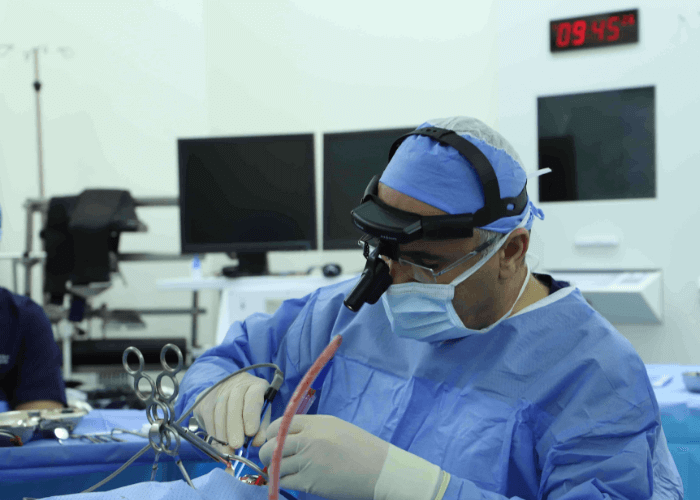Allergic Rhinitis Treatment at DRHC Dubai ENT Clinic
What is Allergic Rhinitis?
Allergic rhinitis, commonly known as hay fever, is an allergic reaction to airborne allergens such as pollen, dust mites, pet dander, or mold. This condition causes inflammation of the nasal passages, leading to symptoms like sneezing, nasal congestion, a runny nose, and itchy eyes. At DRHC Dubai, we offer comprehensive diagnosis and personalized treatment plans to help patients manage and alleviate their symptoms effectively.
Symptoms of Allergic Rhinitis
- Sneezing, especially in rapid succession
- Nasal congestion and a runny nose
- Itchy nose, throat, or eyes
- Watery, red, or swollen eyes
- Postnasal drip (mucus in the throat)
- Headache and facial pressure
- Fatigue due to poor sleep quality caused by nasal congestion
Causes and Triggers
Allergic rhinitis occurs when the immune system overreacts to harmless airborne substances. Common triggers include:
- Seasonal allergens: Pollen from trees, grass, and weeds
- Indoor allergens: Dust mites, mold, pet dander
- Environmental factors: Smoke, pollution, strong odors
Diagnosis of Allergic Rhinitis
At DRHC Dubai, our specialists diagnose allergic rhinitis through:
- Medical history and symptom assessment – Understanding the patient’s symptoms, triggers, and medical background.
- Physical examination – Checking for nasal congestion, swelling, and postnasal drip.
- Allergy testing – Skin prick tests or blood tests to identify specific allergens.
- Nasal endoscopy – In some cases, to examine the nasal passages and rule out other conditions.
Treatment Options for Allergic Rhinitis
1. Avoidance of Allergens
The first step in managing allergic rhinitis is minimizing exposure to triggers:
- Keep windows closed during high pollen seasons.
- Use air purifiers and dehumidifiers.
- Wash bedding frequently to remove dust mites.
- Bathe pets regularly to reduce dander.
- Avoid strong perfumes, smoke, and pollutants.
2. Medications for Symptom Relief
- Antihistamines: Reduce sneezing, itching, and runny nose (e.g., loratadine, cetirizine, fexofenadine).
- Decongestants: Provide short-term relief from nasal congestion (e.g., pseudoephedrine, oxymetazoline nasal spray).
- Nasal corticosteroids: Reduce inflammation and congestion (e.g., fluticasone, budesonide, mometasone).
- Leukotriene receptor antagonists: Help control allergic responses (e.g., montelukast).
- Saline nasal irrigation: Flushes allergens from the nasal passages and provides relief from congestion.
3. Allergy Immunotherapy (Desensitization Therapy)
For severe cases or when medications are ineffective, allergen immunotherapy may be recommended:
- Allergy shots (subcutaneous immunotherapy - SCIT): Regular injections to desensitize the immune system over time.
- Sublingual immunotherapy (SLIT): Allergy tablets placed under the tongue as an alternative to injections.
4. Lifestyle and Home Remedies
- Steam inhalation to relieve nasal congestion.
- Using a humidifier to maintain optimal indoor air moisture.
- Regular exercise improves immune function and reduces inflammation.
- Drinking plenty of fluids to thin mucus secretions.
Why Choose DRHC Dubai for Allergic Rhinitis Treatment?
At DRHC Dubai, we provide:
- Expert allergists and ENT specialists are experienced in diagnosing and treating allergic rhinitis.
- Advanced diagnostic techniques for precise allergy identification.
- Personalized treatment plans tailored to individual needs.
- Cutting-edge immunotherapy options for long-term relief.
- Comprehensive patient education on managing symptoms effectively.
Click here for ENT surgical packages
.png?width=281&height=59&name=bookanappointment%20(1).png)
Dubai ENT clinic—If you are looking for an ENT specialist in Dubai, DRHC provides experienced and leading ENT doctors for healthy treatment. To book an appointment, please call +97142798200 today!




.png?width=281&height=59&name=bookanappointment%20(1).png)
.jpg?width=1080&height=1080&name=DR%20HATEM%20(1).jpg)



